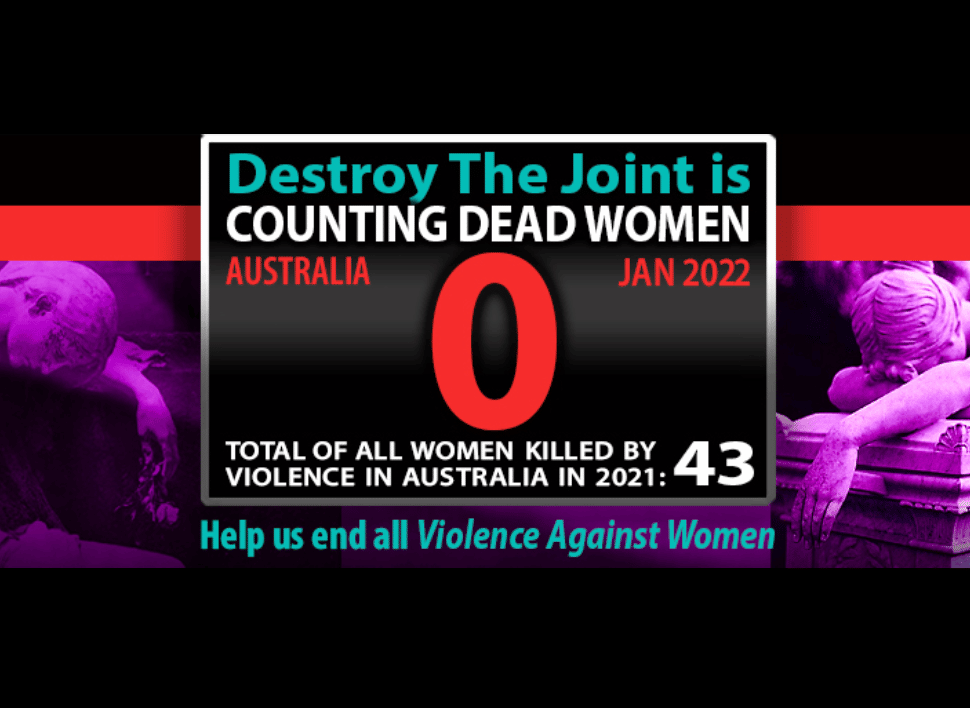The number of women killed by violence in Australia currently stands at 49, far surpassing that of 2021 when 43 such deaths were recorded.
The horror statistic comes from Destroy The Joint, which carefully researches the known deaths of women to present and publish the figures — and keep violence against women firmly on the media and national agenda.
On Wednesday, Destroy The Joint confirmed two further deaths of women to sadly add to their count, including Danielle Finlay-Jones, a 31-year old teacher and women’s football director, who was found with critical injuries by friends in an apartment in Cranebrook NSW. The researchers also confirmed the additional death of a 37 year old woman, found in a unit in Sydney by emergency services who were undertaking a welfare check.
There have been nine deaths of women by violence recorded for December.
Five days ago, the researchers confirmed another two deaths of women as having been killed by violence, in two separate attacks: including a 24 year old woman found unresponsive in a car park in Perth, and a 44 year old woman who died in her home with multiple stab wounds in Queensland.
The researchers say they are also monitoring a number of other deaths that date back months and years, that are not published within their records.
The sad reality is that with ten days to go before the end of 2022, the trend line shows that we’re unlikely to end the year at 49 — especially given the Christmas and New Year period ahead, which can be an even more dangerous time for violence, and especially for domestic and family violence.
Data from previous years shows that domestic and family violence spikes over Christmas and the New Year period. This period can be associated with added emotional and financial stress, as well as an increase in alcohol and gambling. It’s also a period when schools and workplaces — which can be safe spaces for survivors of domestic and family violence — are closed.
Meanwhile, this latest 49 national figure comes as NSW releases its own annual report on domestic and family violence, revealing further horrors numbers.
In NSW alone, there were 31,775 recorded incidents of domestic violence-related assaults in the 12 months to June 2022, according to the stats released on Wednesday, which also found there had been 137 domestic-violence related murders in the state in the five years until December 2021. Disturbingly, despite the annual report revealing these stats making 122 recommendations since the 2011-2011, just two in five such recommendations have been implemented.
We have the data on violence against women. We know at least part of the death count (it’s likely to be higher), and we have reports on the hospitalisations and the tens of thousands of incidents of domestic violence. We also have plenty of experts and advocates who know just what needs to be done — as well as key recommendations being presented and often accepted by governments. But as has been seen in NSW, and as has occurred at the Federal level for years, these recommendations continue to go ignored.
Targets will be set, goals of eliminating all such violence will be established, but without a coordinated and well-funded state and federal response that actually implements recommendations and listens to the experts, it’s hard to see how 2023 will be any different from 2022, or 2021, 2019 and so on, when it comes to violence. If anything, given the upwards trend, it could be worse.
Every time Destroy The Joint records another death of a woman killed by violence, they update the image on their Facebook page to clearly show the annual count. Scrolling through these images this morning, there is one that is particularly sobering: the image that displayed the figure 0, published back on the 10th January 2022.
Twelve months ago, 49 women continued to see their family and friends, to live out their ambitions, pursue their work and consider their futures, before they senselessly became part of the 2022 toll of violence against women.
If you or someone you know is impacted by sexual assault or family violence, call 1800RESPECT on 1800 737 732 or visit www.1800RESPECT.org.au
In an emergency, call 000.




